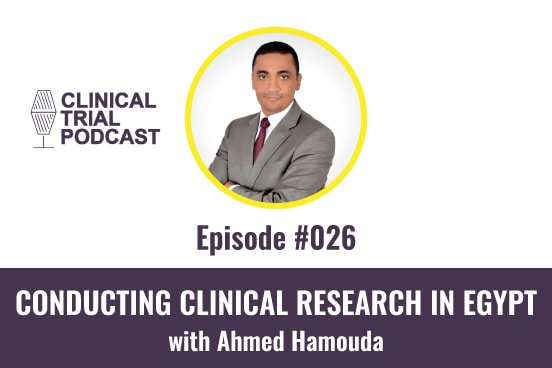In this interview, I had the opportunity to speak with Ahmed Hamouda.
Ahmed is the Head of Clinical Operations at RAY-CRO in Egypt and a certified clinical research professional with more than 10 years of experience within the clinical research field.
I’ve been intrigued and fascinated by the Middle East and have wondered how trials are conducted in the region.
If you’ve been site and country selection meetings trying to determine whether you want to conduct trials in Egypt but have more questions than answers, this interview is for you.
You’ll hear Ahmed breakdown the exact clinical trial conduct process in Egypt step-by-step.
Ahmed has worked in a wide variety of professional capacities over different regions and markets in the Middle East, Gulf, Europe, and Asia.
He is a pharmacist by education and received his MBA in 2013. Aside from being a clinical research professional, Ahmed likes to dive and explore new cultures.
Show Notes:
Ahmed Hamouda on LinkedIn
[03:00] Ahmed’s background and experience working in the Middle East
[04:50] Value of conducting trials in the Middle East
-
- A large population of over 300 million people
- 21 countries in the region
- Prevalence of diseases such as cardiovascular and hypertension
[10:25] Reasons why some Sponsors and CROs are not doing research in Egypt
-
- Lack of awareness of Egypt’s capabilities
- Long approval times for exporting blood samples
[11:45] Importation process for medical products in Egypt
-
- Certificate of Analysis and quality documents
[15:10] Site Start-up Process
-
- Select sites
- Secure IRB approval (~1 month)
- Ministry of Health Approval i.e. MoH (~2 months)
- Observational trials can start right away
- Interventional trials require additional review (see below)
- Interventional trials (~2 months)
- Biological are submitted to The National Organization for Research and Control of Biologicals (NORCB)
- Non-biological are submitted to The National Organization for Drug Control and Research (NODCAR)
- Importing investigational medical product (IMP)
- Central Administration of Pharmaceutical Affairs (CAPA)
[21:45] Role of MoH vs. NORCB/ NORDCAR
-
- MoH will review study-specific documents such as protocol, eCRFs, CVS, patient-facing materials, insurance, patient diaries, signed contracts, etc.
- NORCD/ NODCAR will review information specific to the investigational product
[24:35] Process for adding more sites midway through the study
[27:40] Trial classification in Egypt – Phase I, II, III
[31:30] IRB rejections (decline) and how they are managed
[33:20] Product approval and commercialization
-
- The concept around open-box vs. close box
- Pricing file is the limiting factor
- Naming list
- Pharmacovigilance (PV) files
[37:55] Contracts and Budgets
-
- Required at the time of IRB and/or MoH submission
- Exceptions are handled via Sponsor/ CRO generated commitment letters
[40:40] Clinical Trial Research Units in Egypt
[44:50] Allocation of budget and distribution between the site and the investigator
[46:00] Use of clinical trial contract templates
[47:25] Contracts are in English and Arabic
[48:00] High-quality translations are achieved with the help of medically trained and certified translation company
[50:15] Site selection process
[53:00] Lack of computerized system at the site can cause issues
[56:50] Career advancement for clinical research professionals in Egypt
[1:00:45] Social responsibility on part of CRO
Other Resources:
- RAY CRO
- Pharma Med, a medical translation company
- ICH GCP Guidelines








1 Thought on "Conducting Clinical Research in Egypt with Ahmed Hamouda"
Shivani Nikam
July 23, 2020We are new medical device (Software) manufacturer and we do not have ISO 13485 in place right now. So I have the following queries to be clarified;
1. Do we need to have ISO 13485:2016 (QMS) in place before going for the clinical trials of medical software in Egypt?
2. If QMS is not required to start the trials (we will be implementing it concurrently), then what are all the documents need to be submitted before performing the clinical trials in egypt?